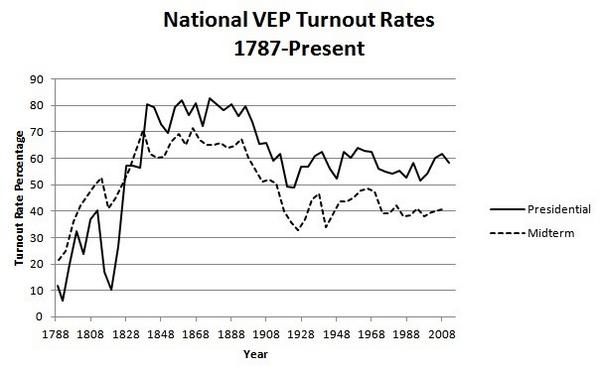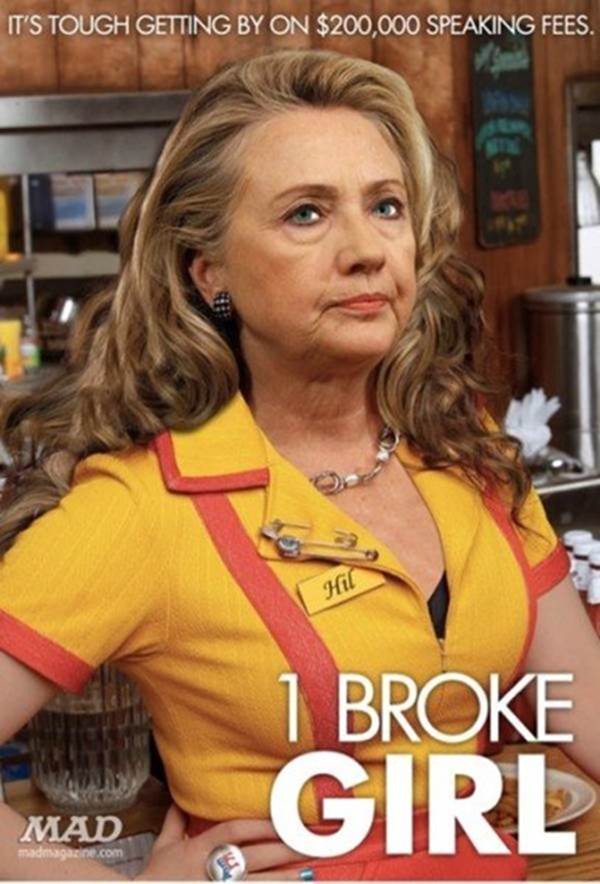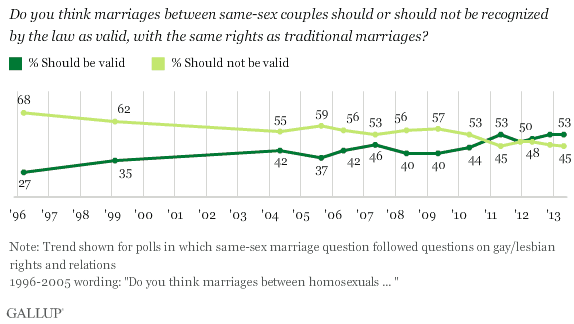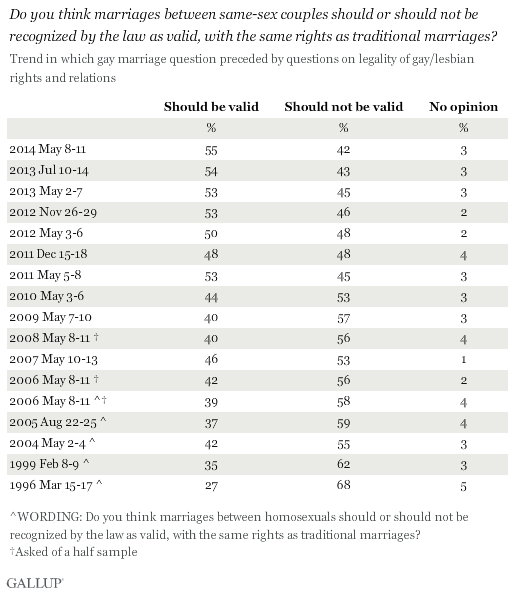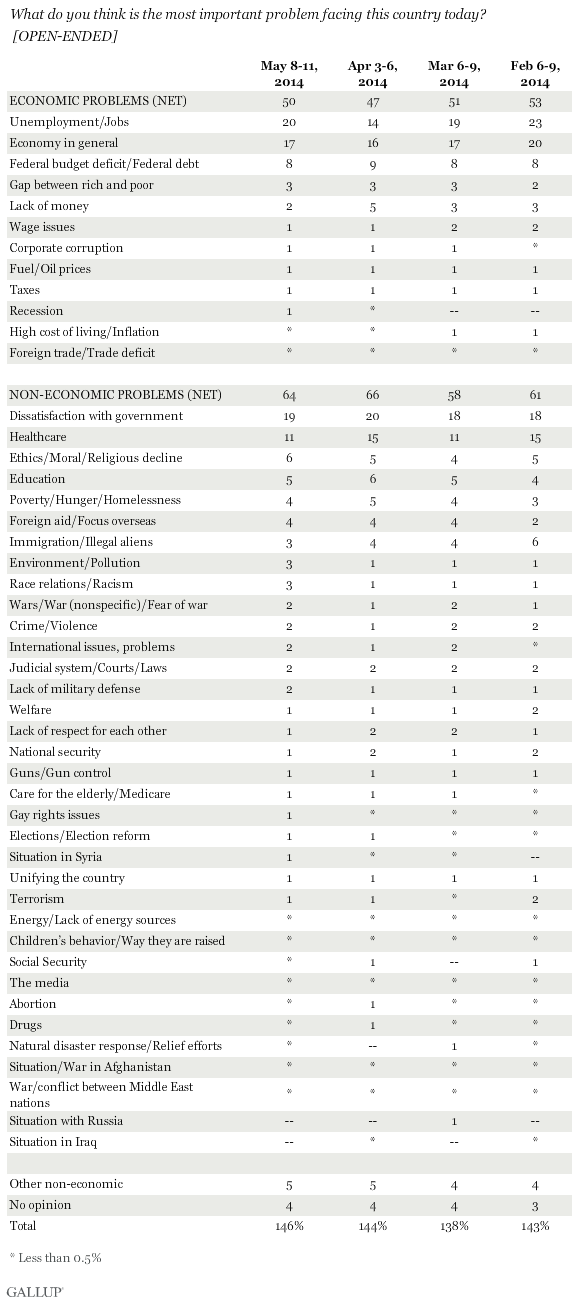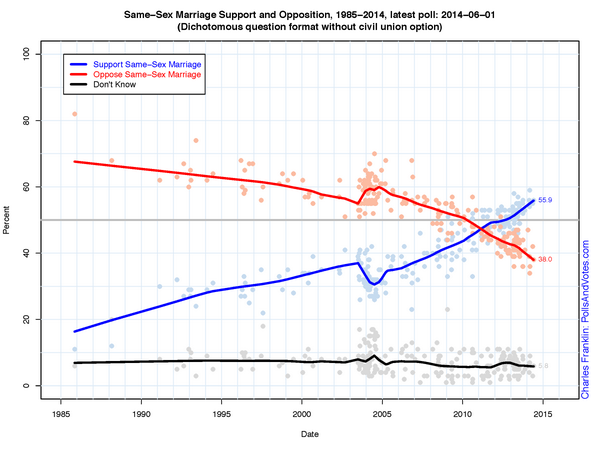The latest Quinnipiac nationwide survey of registered voters has Hillary Clinton holding a slight lead over Donald Trump, 45%-41% (margin of error of +/- 2.5%). That’s consistent with the polling averages at Huffington Post, which have Clinton up 42.7%-40.8%, and at RealClearPolitics, which has Clinton leading Trump 44%-42.5%. Of course, as I’ve noted before, head-to-head polling is still not very predictive at this point in the race, and really won’t be until after the nominating conventions. This is particularly true with Clinton still in a fight for the Democratic nomination, while Trump is moving ahead to unify Republicans behind him. It is also the case that fully 15% of respondents chose not to back either candidate. Nonetheless, it is interesting to look at the internals of recent polls to get a sense of what is driving the results.
Perhaps the most surprising result in the Quinnipiac polls is that when asked who they found more trustworthy and honest, Clinton or Trump, 44% of respondents chose Trump, compared to 39% who selected Clinton. Obviously some of the responses are conditioned by the respondent’s partisan affiliation – Democrats rate Hillary higher, while Republicans view Trump as more trustworthy. But among independents, Trump led by an even greater 15%, 44%-29%.

How can this be? Isn’t Trump the candidate that Politifact fact-checked and rated close to 80% of the statements of his that they checked as false, mostly false or meriting a Pants on Fire? Given his documented record of making false statements, how could survey respondents rate him more trustworthy than Clinton? This result isn’t unique to Quinnipiac, mind you. In the latest ABC/Washington Post poll, Trump also “led” Clinton 42%-41% among registered voters on the honesty/trustworthiness question.
One explanation is that because Clinton hasn’t been able to secure her party’s nomination, some Democrats and likely Sanders’ supporters are more willing to say that Trump is more trustworthy as a form of protesting Clinton’s candidacy rather than as a statement in favor of Trump’s honesty. As evidence, note that more than twice as many Democrats – 10% – said Trump was more trustworthy than did Republicans – 5% – about Clinton.
A second possible explanation is that Trump draws disproportionately from less educated supporters who may be less able to judge the veracity of Trump’s statements – or less willing to care whether what he says is true or not.

Note that in the Quinnipiac survey, those without a college education are more likely to rate Trump as the more honest of the two than are the college educated.
However, I think a third factor is at play here. For many Trump supporters, his trustworthiness and honesty is not measured by how factually correct his statements are. Instead, it is better gauged by his willingness to speak candidly about issues, even if he does so in ways that are not viewed as politically correct, and which may create a media backlash. Again and again I heard his followers at his rallies say that they appreciated his willingness to talk about issues that other candidates shied away from, regardless of the potential consequences. They tended to dismiss his exaggerations as “Donald being Donald”. In contrast, for many voters, Clinton often appears too clever by half, with her every statement carefully crafted to appeal to a potential voting bloc or interest group. That, combined with her long history of being embroiled in controversy, from Whitewater through the Lewinsky affair to concerns about her finances to the current questions about her speaking fees and the ongoing email controversy, has made many voters uneasy regarding her credibility. Her careful parsing of statements regarding whether she exchanged classified material on her private email server is a case in point. Did she lie? Probably not. Was she being completely candid? Many voters have their doubts.
In short, when asked about candidate honesty or trustworthiness, many voters do not respond in terms of whether the candidates’ statements are factually accurate. Instead, they are using a slightly different metric – one based on whether they think the candidate’s statements are candid and sincere. I was reminded of this a couple weeks back when a CNN panel of talking heads was vigorously debating how much blowback Trump would receive if his tax returns showed that he was only worth $4 billion or even less, as opposed to the more than $10 billion Trump claims. If his tax returns show he is lying, it would certainly earn Trump still another Pants on Fire rating. And yet my sense is that for potential Trump supporters, the answer isn’t nearly as important as the talking heads were making it out to be. Potential Trump supporters know he is very rich – he practically shouts it at them in every rally, when he explains how he can’t be bought. If it turns out he is only half as rich as he claimed to be, he’s still very rich, and his broader point still holds, at least to his potential supporters.
My point here is not to defend Trump or, for that matter, to make a virtue of his spouting blatant falsehoods. Nor should we exaggerate the differences in the survey results between Trump and Clinton when respondents are asked to compare the two candidates’ honesty and trustworthiness. The difference is not great, at least based on recent polls. But the fact that Trump is viewed by slightly more respondents as more trustworthy, instead of Clinton, does seem somewhat shocking, given the almost daily media story documenting still another Trump statement as untrue. The explanation, I think, is that many voters, when asked about trustworthiness and honesty, think in terms of candidate sincerity and candidness, as much or more than they do about the factual accuracy of candidate statements.
Is Clinton honest? Is Trump? It depends on the meaning of honesty!

